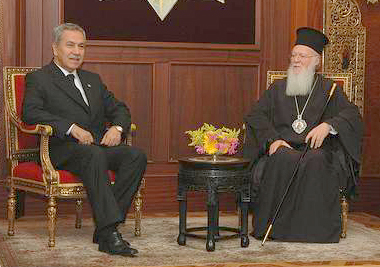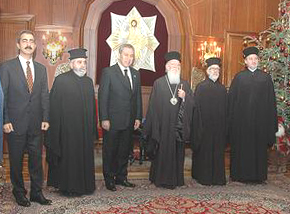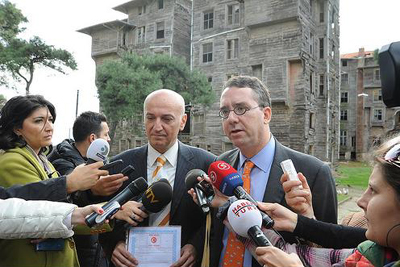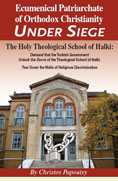 |
|||
|
Turkey Progresses in Discussions with Ecumenical Patriarchate |
|||
 Turkish Deputy Prime Minister Arinc with His All Holiness Patriarch Bartholomeos.(Photo by Andreas Rombopoulos) |
For decades Turkey has ignored requests of the Patriarchate, due to historic conflicts with Greece and minority Orthodox Christians. But on 3 January 2011, State Minister and Deputy Prime Minister Bulent Arinc, former House Speaker of the Turkish Parliament (2002-2007), visited the Patriarchate's Phanar-district headquarters. During his high-profile visit, he held private conversations with His All Holiness Ecumenical Patriarch Bartholomeos I, members of the Holy Synod, and representatives of the dwindling ethnic Greek minority of Istanbul. Following the meetings, the Arinc attended a reception and addressed the media with Patriarch Batholomeos.Two ministers visited the Patriarchate in the past two years, but Arinc is the highest ranking government official to visit since the 1950s. |
||
This rare visit is the latest in a series of news-worthy events that have taken place concerning the Turkish government and the Patriarchate. Veteran observers credit subtle, but sustained diplomatic efforts by EU officials with spurring reforms in Turkey as the predominantly Muslim country enacts reforms necessary for membership in the European Union. Of particular concern are Turkey's record on human rights, including religious freedom, and her record in observing signed treaties. Although Turkish politicans and officials have embarked on reforms in a number of areas, the country has a huge chasm to span in reaching western standards. Indeed, there has been little--if any--movement in addressing historic concerns of neighboring countries and ethnic groups, some of which date back many decades. |
|||
 Ecumenical Patriarchate and members of Holy Synod and ethnic Greek community meet with Dep. Prime Min. Arinc. |
For example, Turkey still illegally occupies one-third of an EU member-state that has no army or defense of its own, Cyprus, and shows no signs of withdrawing her troops or recognizing the sovereignty of the island-state. Repeated U.N. resolutions calling for the withdrawal of Turkish troops have been ignored for more than 40 years. Cypriots are quick to point out that there has never been any apology for the loss of 1600 Cypriot lives (and 8 Americans) when the Turkish army invaded the small country and displaced more than 200,000 legitimate home-owners, let alone an effort to compensate owners for loss of property or livelihood. In the intervening time, hundreds of sacred Christian churches, many of them historically significant and dating to Byzantine periods, have been sacked, looted, and desecrated. And there are many, many more such grievances, both domestic and international, which continue to plague Turkey's efforts to move into the western circle of nations. |
||
The European Commission's 2010 progress report cited restrictions on the training of clergy and other religious practices. The Islamic-rooted government claims that it seeks to promote religious freedom, loosening tight state controls that are a legacy of Turkey's secular founder, Ataturk. But some European officials doubt the ability of Turkey to join European society, citing as examples Turkey's poor record in treating minorities and the failure of its workers to integrate into EU countries. Austrian politician Ewald Stadler recently summed up Europe's concerns in a spirited address. Turkish politicians offered a pointed retort. |
|||
 Lawyers representing the Ecumenical Patriarchate finally obtained the formal property title for the confiscated orphanage. Photo by N. Manginas. |
Arinc entered the Patriarchate from a side gate and passed through a coutryard before entering the patriarchate's headquarters and sitting with Patriarch Bartholomeos I, the spiritual leader of the world's Orthodox Christians. The main entrance remains welded shut out of respect for Patriarch Gregory V, who was accused by Turkish officials of conspiring against the Ottoman Empire at the outbreak of the Greek War of Independence and was hanged from it in 1821, suffering the same fate as other patriarchs in previous centuries during ethnic and religious rebellions against Ottoman slavery. The talks between the Ecumenical Patriarch and Arinc focused on several issues, including the reopening of the Theology School of Halki and the operation of the Ecumenical Patriarchate, "primus inter pares" of the world's Christian Orthodox Patriarchates. |
||
Another long-standing issue involves property seized over the decades from the Ecumenical Patriarchate and ethnic Greek charitable foundations in Turkey, as the return of such real estate holdings requires the Turkish government’s direct cooperation. After many decades of Turkish intransigence on valid requests by the Patriarchate and the Orthodox community, legal action on behalf of the Patriarchate at the Court of Human Rights in Europe, has brought about a return of illegally seized property. Bartholomew thanked the deputy prime minister for the recent return of a 19th-century, historic Greek Orthodox orphanage on the Marmara isle of Büyükada (Prinkipo) to the Ecumenical Patriarchate, one of hundreds of sites confiscated by the Turkish government, and reminded him that 2011 marks 40 years since the Theology School on the isle of Halki was shut down. "Today is a very happy day for us," said Patriarch Bartholomeos. "It has strengthened our hopes." |
|||
|
Prime Minsiter Recep Tayyip Erdogan's government recently granted Turkish citizenship to 14 senior clerics from North and South America as well as Hong Kong, South Korea and Crete, said a spokesman for the Patiarchate. About eight more clerics were still waiting for Turkish citizenship, a requirement for anyone who succeeds Bartholomew. The Patriarch has complained repeatedly that the closure of the Halki seminary in 1971 prevented raising new leaders for the Church and made it difficult for the dwindling Greek community of several thousand to produce any candidates. Because of government-sponsored pogroms in the 1950s and 60s, a once thriving ethnic community numbering in the hundreds of thousands now struggles to retain its identity. Turkey's complicity in the Septemvriana, a Greek "Kristallnacht" in 1955, along with discriminatory practices against non-Muslims and non-Turks, has nearly wiped out this ethnic element in Istanbul. |
||
|
|
|||
|
The Halki Theological School on Heybeliada Island, near Istanbul, was closed to new students in 1971 under a law that put religious and military training under state control. The School closed its doors in 1985, when the last five students graduated. "The visit by the deputy prime minister to our Patriarchate has both excited us and raised our hopes for a solution to our problems," said Paul Vingas, a member of the Greek Orthodox community. |
||
|
In the meantime, the School remains ready, as ever, to resume its historic role in educating the spiritual leaders of 300 million Orthodox Christians worldwide. Devoted faithful across the globe watch the news from the Phanar district and hope for more conciliatory signs. Political observers monitor Turkish progress on this issue, a representative microcosm of Turkey's efforts to address human rights issues overall, and mark it as a sign of Turkey's willingness to resolve conflicts peacefully and fairly, and thus to signal earnestly her readiness to move into western circles. |
|||
|
(Posting date 28 January 2011) HCS encourages readers to view other articles and releases in our permanent, extensive archives at the URL http://www.helleniccomserve.com/contents.html. |
|||
|
|||
|
2000 © Hellenic Communication Service, L.L.C. All Rights Reserved.
http://www.HellenicComServe.com |
|||

